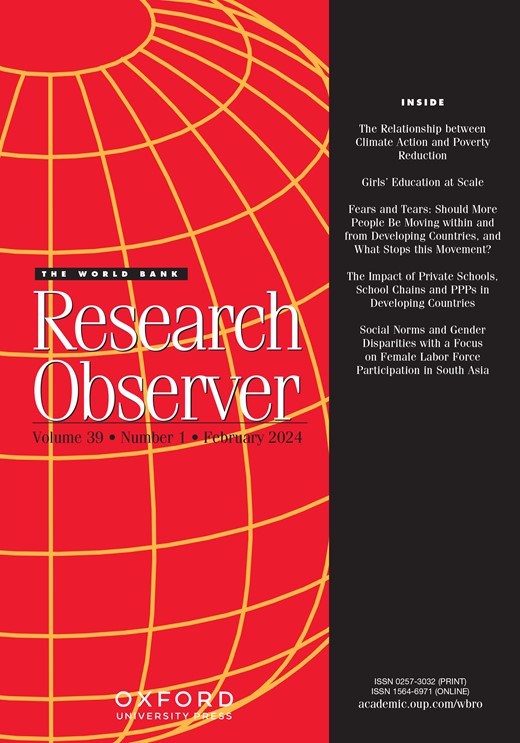EdTech in Developing Countries: A Review of the Evidence
IF 3.3
1区 经济学
Q1 DEVELOPMENT STUDIES
引用次数: 23
Abstract
The emergence of educational technology (“EdTech”) in developing countries has been received as a promising avenue to address some of the most challenging policy questions within educational systems. In this paper, I review and synthesize all existing studies with credible causal identification frameworks of EdTech interventions in developing countries. While other studies review the evidence for EdTech interventions in developed countries, there is currently no equivalent study for developing contexts, in spite of the rising number of studies being produced. I classify studies into four thematic categories based on the type of EdTech intervention analyzed: Access to technology; technology-enabled behavioral interventions; improvements to instruction; and self-led learning. I find that EdTech interventions centered around self-led learning and improvements to instruction are the most effective forms of EdTech at raising learning outcomes. Similarly, technology-enabled behavioral interventions are less promising for generating large effects but highly cost-effective given their typically low marginal costs. Although expanding access to technology alone is not sufficient to improve learning, it is a necessary first step for some other types of interventions. More broadly, the overall success of interventions rests on the thoughtful customization of the EdTech solution to the policy constraints at hand. Finally, EdTech interventions across all thematic areas can and should act as complements by leveraging their respective comparative advantages to address deficiencies within educational systems in developing countries.发展中国家的教育技术:证据综述
教育技术在发展中国家的出现被认为是解决教育系统中一些最具挑战性的政策问题的一个很有前途的途径。在本文中,我回顾并综合了发展中国家教育技术干预的所有现有研究和可信的因果识别框架。虽然其他研究审查了发达国家教育技术干预措施的证据,但尽管正在进行的研究数量不断增加,但目前还没有针对发展中背景的同等研究。根据所分析的教育技术干预类型,我将研究分为四个主题类别:获得技术;技术支持的行为干预;改进教学;以及自主学习。我发现,以自主学习和改进教学为中心的教育技术干预措施是教育技术提高学习成果的最有效形式。同样,技术支持的行为干预在产生巨大效果方面不太有希望,但鉴于其典型的低边际成本,具有很高的成本效益。尽管仅扩大获得技术的机会不足以改善学习,但对于其他类型的干预措施来说,这是必要的第一步。更广泛地说,干预措施的总体成功取决于对EdTech解决方案的深思熟虑的定制,以应对当前的政策限制。最后,教育技术在所有主题领域的干预措施都可以而且应该发挥补充作用,利用各自的相对优势来解决发展中国家教育系统中的不足。
本文章由计算机程序翻译,如有差异,请以英文原文为准。
求助全文
约1分钟内获得全文
求助全文
来源期刊

World Bank Research Observer
Multiple-
CiteScore
12.60
自引率
1.20%
发文量
8
期刊介绍:
The World Bank Journals, including the Research Observer, boast the largest circulation among economics titles. The Research Observer is distributed freely to over 9,100 subscribers in non-OECD countries. Geared towards informing nonspecialist readers about research within and outside the Bank, it covers areas of economics relevant for development policy. Intended for policymakers, project officers, journalists, and educators, its surveys and overviews require only minimal background in economic analysis. Articles are not sent to referees but are assessed and approved by the Editorial Board, including distinguished economists from outside the Bank. The Observer has around 1,500 subscribers in OECD countries and nearly 10,000 subscribers in developing countries.
 求助内容:
求助内容: 应助结果提醒方式:
应助结果提醒方式:


